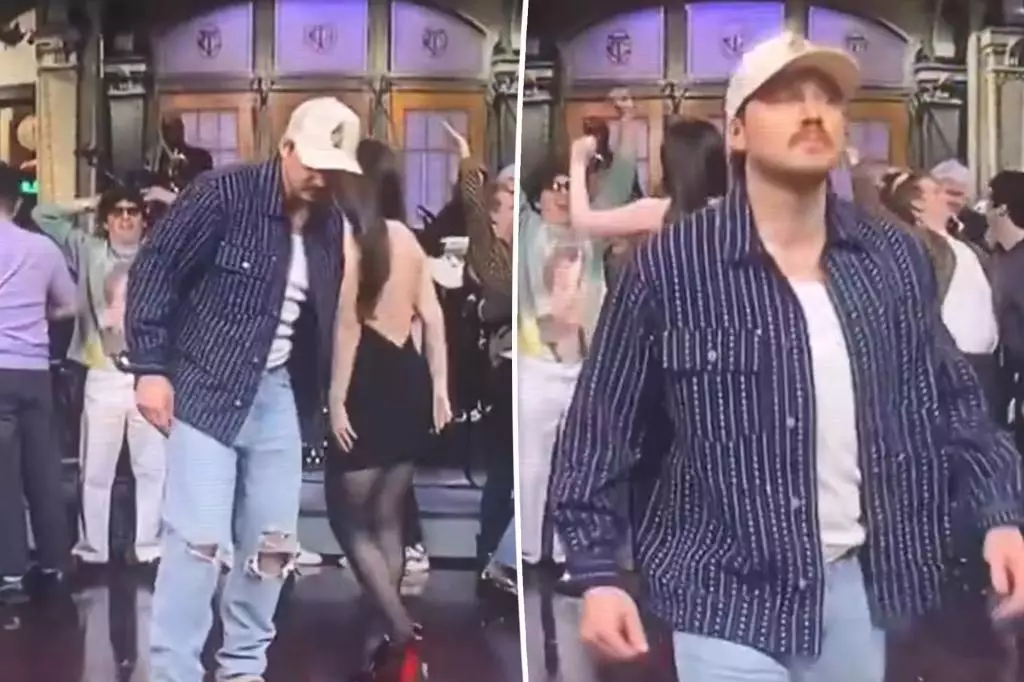Morgan Wallen’s brief tenure as the musical guest on “Saturday Night Live” took an unexpected and controversial turn when the singer abruptly exited the stage just as the credits began to roll. After a performance that had many country music enthusiasts tapping their toes, host Mikey Madison concluded the episode with grace and gratitude, thanking Wallen for his contribution. However, while cast members celebrated, Wallen took a detour—skipping customary interactions with the “SNL” crew and instead bolting down the aisle in silence. This moment, meant to cultivate connection, became the focal point of fan outrage and speculation.
Social media erupted post-show, with fans expressing bewilderment and indignation at Wallen’s behavior. Tweets flooded in, with one user exclaiming it was “the strangest ‘SNL’ ending credits” they’d ever witnessed. Others characterized Wallen’s exit as a “tantrum,” suggesting that the artist could have handled the situation with more decorum. The consensus was clear: viewers felt that active participation in the show’s celebratory atmosphere was not only customary but essential, especially for a musical guest receiving such national attention.
The Trending Hashtag: A Social Media Backlash
The blowback on social platforms was swift and unforgiving. Descriptions of Wallen’s departure ranged from “catty” to “petty,” with many users calling out his apparent disregard for the camaraderie that typically colors the “SNL” experience. Critiques ranged from harsh to downright scathing. The use of phrases like “little bitch storming off the stage” encapsulated a certain level of performative righteousness. Here, a viewer’s disappointment transformed into an aggressive condemnation of Wallen’s behavior, suggesting that his actions were not only unbecoming of a star but reflected deeper issues of self-control.
While public opinion swirled in a maelstrom of hashtags and quick judgments, some stood with Wallen. A source close to the musician claimed that his swift departure was merely a mistake, indicative of a routine he followed during rehearsals. This explanation attempted to absolve Wallen, painting him not as a spoiled star but rather as someone caught in the hustle of live performance—a visualization of a man simply trying to exit the spotlight in the same way he entered it.
Morgan Wallen: A History of Contentious Moments
Wallen’s controversial reputation precedes him. In the wake of previous incidents—chief among them being disinvited from “SNL” in October 2020 due to flouting COVID-19 protocols and a subsequent scandal involving a racial slur—this latest incident raises questions about Wallen’s growth and accountability as an artist. Though the public criticized his behavior, it also overshadowed any advancement he had made in terms of addressing his past mistakes.
Apologies only take an artist so far, particularly in an era where cancel culture looms large. Wallen’s inconsistency between artistic talent and personal conduct forms a pattern that fans have begun to scrutinize closely. Notably, backlash against his music has often paralleled criticisms of his personal life. Therefore, reactions on social media are not just reflexive but symptomatic of a larger issue in celebrity culture, where the public’s love for an artist can swiftly flip to disdain.
The Dissonance of Public Persona and Personal Accountability
This incident fundamentally reflects the disconnect often present in the lives of contemporary celebrities: the dichotomy between public adulation and personal responsibility. Wallen’s talented performances do not negate the reckless behavior displayed in the past, nor do they excuse the perceived lack of respect shown during his “SNL” appearance. In a world where celebrity influence is potent, accountability becomes paramount. As fans continue to lash out against perceived slights, we are also led to question the nature of our engagement with public figures and how their actions resonate within our personal ethical frameworks.
Such incidents act as litmus tests for both artists and their supporters, illuminating the complexities of celebrity culture. Though Wallen retains a dedicated fanbase actively streaming his music, moments like these contribute to a volatile brand image—one that can be both adored and detested with equal fervor. In the end, the conversation surrounding Morgan Wallen encapsulates the dual roles that public figures must navigate: that of a celebrated artist and a flawed human, wielding both love and criticism as a constant in their career journey.

